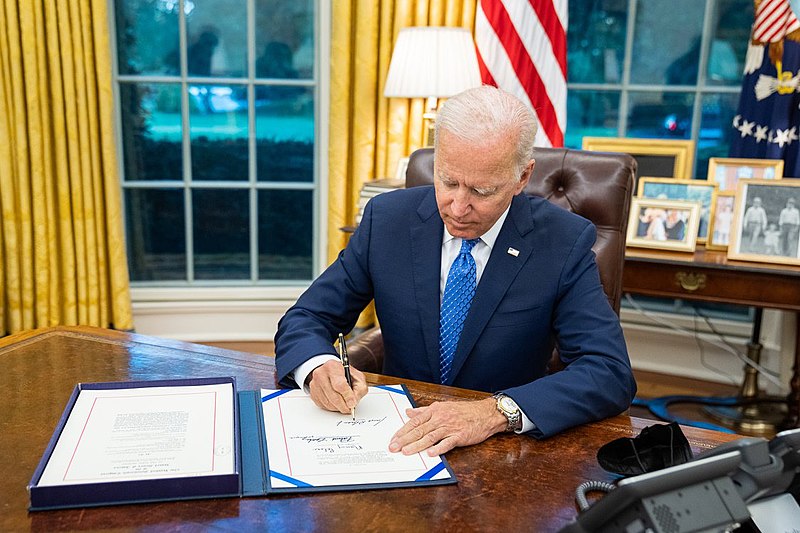Since taking office in January, US President Joe Biden has had a record number of firsts made under his presidency, from legislation to nominations. Over the weekend, Biden marks another first, issuing a proclamation to commemorate Indigenous Peoples’ Day.
The White House released Biden’s proclamation of making October 11 the day to commemorate the country’s indigenous peoples, highlighting their contributions to the country. Biden also noted the painful history that the country’s indigenous peoples have suffered at the hands of European settlers and colonizers. Biden becomes the first president to make such a proclamation on a national level, following cities and states that have already replaced Colombus Day with Indigenous Peoples’ Day.
“On Indigenous Peoples’ Day, our Nation celebrates the invaluable contributions and resilience of Indigenous peoples, recognizes their inherent sovereignty, and commits to honoring the Federal Government’s trust and treaty obligations to Tribal nations,” wrote Biden.
“It is a measure of our greatness as a Nation that we do not seek to bury these shameful episodes of our past -- that we face them honestly, we bring them to the light, and we do all we can to address them,” wrote the US leader.
Over 100 cities such as Seattle, Denver, Los Angeles, Phoenix, and San Francisco, among others, have already celebrated Indigenous Peoples’ Day in place of Colombus Day. Minnesota, Alaska, Vermont, Illinois, and Oregon have also done the same. The city of Berkeley, California was the first city to commemorate Indigenous Peoples’ Day back in 1992.
In other news, Biden has officially raised the refugee admissions cap for the fiscal year to 125,000. This follows a low record of refugee admissions for the 2021 fiscal year, with only 11,400 refugees admitted into the US despite the cap being at 62,500. The fiscal year for 2022 began on October 1.
Biden raised the cap to 62,500 back in May after backlash for sticking with the Trump administration’s refugee admissions cap. The breakdown of refugees allocated per region showed 40,000 from Africa, 15,000 from East Asia, 10,000 from Europe and Central Asia, 15,000 from Latin America and the Caribbean, and 35,000 from the Near East and/or South Asia.
There is an additional 10,000 from an unallocated reserve that would be distributed to regional ceilings if needed.



 U.S. Deploys Tomahawks, B-2 Bombers, F-35 Jets and AI Tools in Operation Epic Fury Against Iran
U.S. Deploys Tomahawks, B-2 Bombers, F-35 Jets and AI Tools in Operation Epic Fury Against Iran  Trump Says U.S. Combat Operations in Iran Will Continue Until Objectives Are Met
Trump Says U.S. Combat Operations in Iran Will Continue Until Objectives Are Met  EU Urges Maximum Restraint in Iran Conflict Amid Fears of Regional Escalation and Oil Supply Disruption
EU Urges Maximum Restraint in Iran Conflict Amid Fears of Regional Escalation and Oil Supply Disruption  Israel Launches Fresh Strikes on Iran After Death of Supreme Leader Ayatollah Khamenei
Israel Launches Fresh Strikes on Iran After Death of Supreme Leader Ayatollah Khamenei  Trump to Address Nation as U.S. Launches Strikes in Iran, Axios Reports
Trump to Address Nation as U.S. Launches Strikes in Iran, Axios Reports  Trump Warns Iran as Gulf Conflict Disrupts Oil Markets and Global Trade
Trump Warns Iran as Gulf Conflict Disrupts Oil Markets and Global Trade  Macron Urges Emergency UN Security Council Meeting as US-Israel Strikes on Iran Escalate Middle East Tensions
Macron Urges Emergency UN Security Council Meeting as US-Israel Strikes on Iran Escalate Middle East Tensions  Middle East Conflict Escalates After Khamenei’s Death as U.S., Israel and Iran Exchange Strikes
Middle East Conflict Escalates After Khamenei’s Death as U.S., Israel and Iran Exchange Strikes  Trump Launches Operation Epic Fury: U.S. Strikes on Iran Mark High-Risk Shift in Middle East
Trump Launches Operation Epic Fury: U.S. Strikes on Iran Mark High-Risk Shift in Middle East  U.S. Lawmakers Question Trump’s Iran Strategy After Joint U.S.-Israeli Strikes
U.S. Lawmakers Question Trump’s Iran Strategy After Joint U.S.-Israeli Strikes  AI is already creeping into election campaigns. NZ’s rules aren’t ready
AI is already creeping into election campaigns. NZ’s rules aren’t ready  Israel Strikes Hezbollah Targets in Lebanon After Missile and Drone Attacks
Israel Strikes Hezbollah Targets in Lebanon After Missile and Drone Attacks  Does international law still matter? The strike on the girls’ school in Iran shows why we need it
Does international law still matter? The strike on the girls’ school in Iran shows why we need it  UK Accepts U.S. Request to Use British Bases for Defensive Strikes on Iranian Missiles
UK Accepts U.S. Request to Use British Bases for Defensive Strikes on Iranian Missiles  Pentagon Leaders Monitor U.S. Iran Operation from Mar-a-Lago
Pentagon Leaders Monitor U.S. Iran Operation from Mar-a-Lago  Russia Signals Openness to U.S. Security Guarantees for Ukraine at Geneva Peace Talks
Russia Signals Openness to U.S. Security Guarantees for Ukraine at Geneva Peace Talks 































